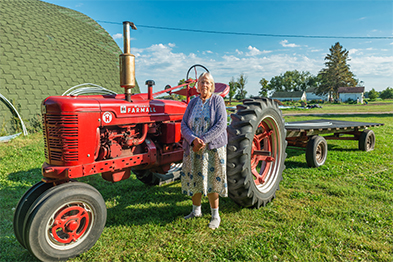We are working actively for the financial viability and for the success of the smaller-scale farm. Knowing that this is part of the way that we want to help-with the renewal of the countryside.
-Verna Kragnes
In an agriculture world that is becoming increasingly focused on technology and automation—which, yes, is the focus of this magazine—the most important cog in the farmstead is being forgotten, the farmer.
Because of this, we want to make a concerted effort to step away from our usual scope of content and highlight some of the everyday people working to nourish our communities by shining a light on the mundane yet beautiful stories they have to tell us from their quiet lives on the farm.
In our first feature, we are highlighting Verna Kragnes, a force in Red River agriculture. Kragnes is one of the founders of New Roots Farm Incubator, a cooperative of farmers from Burundi, Congo, Bhutan and Moorhead working to help empower new Americans in finding a way to contribute towards local food production and grow their own farm enterprises. She is a champion of sustainability and building bridges within the farming community. Here is her story from an average day at Prairie Rose Farm.
PrairieRoots Farm is located a half mile from where Kragnes grew up.

Kragnes poses with a row of corn planted by a Caliton Ntahompagaze, a New Roots co-op member.

Kragnes sits and looks at the spot in the corn crib where she found the kittens.

The Story
Like many beginning farmers who are taking over the tumbledown infrastructure of a farmstead, we have been rehabbing buildings to our purposes. The barn on this farmstead was taken by a tornado a long time ago and was never replaced. One of the remaining buildings was actually two corn cribs that had a roof over the top and a drive-thru between them.
Fast forward to when we brought a cow-calf and a bull as the beginning of our small herd of Dexter cows to the farm, and we essentially made a little barn out of the corn cribs. We were able to put the set of three in the space in between by fencing off the ends until it was time to get them out on pasture. That was a temporary fix this spring, but as winter approaches, and since Dexters are a hardy breed, not needing much protection, we decided to use the space this winter too. The cribs had been used for storage, and as we were cleaning out the two sides of the corn cribs more thoroughly getting ready to load it with straw, we found a nest of kittens!
I just had to smile, my heart opened up with joy and I said, ‘this building must now be officially called “the barn”, because we have this nest of kittens established here.’ We had been talking about bringing cats onto the land and into the farm but we hadn’t done that yet. Instead, we were adopted by a mama cat that needed a place for her kittens.
In my work and my life, I try to find balance. I like the term appropriate technology. I do use technology, even on our 71-acre farm, in varying ways. But I also remember that part of my task as a small-scale farmer is to be re-enlivening some of those homey elements that were and remain archetypally part of what makes the heart and hearth of a farm. This includes having a place for the kittens to live. And in our case, as a community-supported farm (CSA) we’ll have lots of children out interested in playing with them.
There was also the special moment of finding our first pullet egg. It’s been a long time since there were chickens on this land and the other day, we found the first egg. Honoring these little moments are part of bringing alive this particular farmstead again to what it represented in the past as a place that generated good healthy food for those who lived and worked here, and for those in the surrounding neighborhood. I believe that’s the heart and soul of what we do as farmers—to share all that we do with others. And the fact that we find ourselves at this point where technology is replacing the human being feels to me like a real sad place to be in for rural communities. We are working actively for the financial viability and for the success of the smaller-scale farm,. Knowing that this is part of the way that we want to help—with the renewal of the countryside.
To learn more about the Prairie Rose Farm Incubator head to prairieinstitute.net and wcif.org/fund/PRA.
Did you know?
Verna Kragnes is part of the Grand Farm’s Grower Advisory Board, a collection of 10 innovative growers selected to provide advice, critical feedback and recommendations to the Grand Farm management team.
New Roots FarmIncubator Co-op
The original idea for this program can be attributed to conversations between Jack Wood, one of the founders/ organizers for Growing Together (local non-profit managing a series of F/M gardens), and Verna Kragnes during the fall of 2015. Jack expressed a wish for an “economic development component” to be added to the gardens that were farmed communally by F/M area residents including many who had come to Fargo/Moorhead from other countries as refugees.
After further researching the local need, Verna found that local families owning ethnic groceries were traveling weekly to the Twin Cities to purchase produce because specific things they desired were not available currently from local markets. Verna wrote a USDA grant that provided Farm Beginnings© training to the area’s beginning farmers, including many of the founding members of New Roots. Thanks to the support of many, including Partnership4Health, UM RSDP, West Central Initiative, and NPSAS, New Roots is thriving. Last year, the cooperative board voted to have a new non-profit, PRAIRIE (Prairie Rose Agricultural Institute for Research, Innovation & Education) become their fiscal sponsor and as of this summer has launched a capital campaign to co-locate with a permanent home near Prairie Rose Farm/PRAIRIE. www.prairieinstitute.net
PSAS served as a fiscal sponsor for New Roots Co-op from 2018-2021while Verna raised funds for the start-up phase. In 2021, the New Roots Co-op board voted to move this relationship to a new Minnesota nonprofit, PRAIRIE (Prairie Rose Agricultural Institute for Research, Innovation & Education), and relocate to Prairie Rose Farm, an education and demonstration LLC north of Moorhead




